NEW DELHI: India's parliament Wednesday passed legislation to create a powerful anti-graft watchdog following a mass anti-corruption movement that swept the country in 2011 and spurred politicians into action.
The ruling Congress and the main opposition Bharatiya Janata Party (BJP) joined forces in the lower house in a rare display of unity to create a corruption ombudsman in the lower decision-making house of parliament.
BJP house leader Sushma Swaraj praised “the people of this country” for achieving the passage of the bill.
Passage of the bill comes as general elections are due in May.
Voters have become increasingly incensed by a string of corruption scandals that have engulfed the nation.
A stunning poll performance by an upstart party whose mission is to clean up dirty politics gave extra momentum to passage of the Lokpal or ombudsman bill.
Civil servant-turned-corruption fighter Arvind Kejriwal and his Aam Aadmi Party — Common Man Party — trounced Congress in state polls in Delhi this month.
Kejriwal, who campaigned on a promise of cleaning up India's dirty politics, was a key member of the grass-roots movement that demanded the tough law back in 2011 but legislation was stalled by political bickering and debate about the extent of the bill's scope.
Kejriwal's success underscored his potential to damage both of India's main parties when the country goes to the polls next year, analysts said.
The Congress-led government has been shaken by a string of multi-billion-dollar corruption allegations involving allocation of telecommunications spectrum and permits to mine coal that has embroiled premier Manmohan Singh.
The father of the anti-corruption campaign, social crusader Anna Hazare, drank coconut water to break a nine-day fast that he was staging to push for the bill in his home village in western Maharashtra state after the legislation was passed.
“This has been for the country... it has been a lot of work by a lot of people,” Hazare told a rally that was a sea of jubilant supporters waving green, white and orange Indian flags.
The Lokpal Act, which won overwhelming support in India's upper house Tuesday and now goes to the president for formal approval, will serve as a model law for India's states who will have to set up their own anti-corruption bodies.
All ministers and senior public servants are covered by the proposed bill, which was first proposed some 46 years earlier. Even the office of prime minister falls under the scope of the legislation.
The landmark legislation will set up a body with authority to use any investigation agency to probe suspected corruption.














































